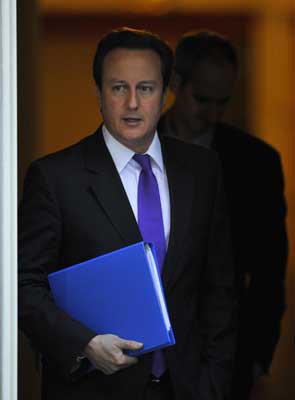Cameron's visit to Beijing to enhance Sino-UK ties
British Prime Minister David Cameron's first official visit to China in November will represent "an important opportunity for elevating China-United Kingdom relations to a new high", according to the Chinese ambassador to the UK.
 |
|
Britain's Prime Minister David Cameron leaves Downing Street to attend parliament in London Oct 20, 2010. [Agencies] |
President Hu Jintao in June invited Cameron to visit China in November, when the two leaders met for the first time during the G20 summit in Toronto. In a 30-minute meeting between the two, Hu congratulated Cameron on becoming prime minister.
The 44-year-old Cameron is the youngest British Prime Minister in nearly 200 years, and his Conservative-Liberal Democrat coalition government is also the first in the UK since WWII.
On his second day in office, Cameron made a special point of telephoning Hu, according to the BBC - a clear signal of the prime minister's readiness to forge stronger relations with China.
"Just like Gordon Brown, the previous British prime minister, Cameron attaches a lot of importance to bilateral ties with China as well," said Tian Dewen, an expert on UK studies at the Chinese Academy of Social Sciences.
International financial order, Chinese investment in the UK, and climate cooperation are likely to be discussed among other topics this time, the expert said.
"With the world economic crisis still looming in the background, economy and finance will dominate the talks - whereas other, more sensitive issues, such as human rights, the trade deficit, and so on, are likely to take a backseat," Tian added.
At the luncheon of the Asian Business Leaders Summit in London on Oct 13, the Chinese ambassador said China remains open for business, and investment in China will only get easier.
"There is no point in giving up on our policy of openness and mutual benefit, as it has proven successful for more than 30 years," Liu said.
After the prime minister's first state visit, Cameron will head to the Republic of Korea (ROK) from China for the upcoming G20 summit in Seoul, where leaders will try to provide the world economy with a sustainable balance.
In the meantime, there have been hot debates on whether the currency exchange rate will come up at all as part of the summit agenda.
Liu said the yuan has not caused global economic imbalances, and that blaming the valuation of the yuan is merely an attempt to shift responsibility.
"An important factor in the imbalances is the excessive spending and inadequate savings in some major economies," he said. "Adjusting the exchange rate is not an effective way to promote the balance of trade."
Reuters has reported that Chinese currency appreciation will not be discussed during the summit. The news agency also quoted the ROK's Finance Minister Yoon Jeung-hyun as saying in late September that it would be inappropriate for a G20 summit in Seoul to discuss that topic - despite United States pressure for faster appreciation.
 0
0 






